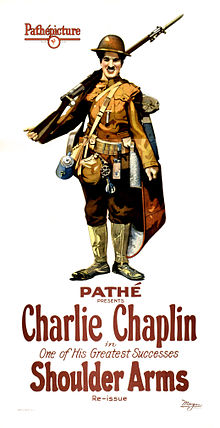Shoulder Arms
| Shoulder Arms | |
|---|---|

Theatrical poster to Shoulder Arms
|
|
| Directed by | Charlie Chaplin |
| Produced by | Charlie Chaplin |
| Written by | Charlie Chaplin |
| Starring |
Edna Purviance Sydney Chaplin |
| Cinematography | Roland Totheroh |
| Edited by | Charles Chaplin |
| Distributed by | First National Pictures |
|
Release date
|
October 20, 1918 |
|
Running time
|
46 minutes |
| Country | USA |
| Language | Silent film English intertitles |
Shoulder Arms is Charlie Chaplin's second film for First National Pictures. Released in 1918, it is a silent comedy set in France during World War I. The main part of the film actually occurs in a dream. It co-starred Edna Purviance and Sydney Chaplin, Chaplin's elder brother. It is Chaplin's shortest feature film as well as the first feature film that he directed.
Charlie is in boot camp in the "awkward squad." Once in France he gets no letters from home. He finally gets a package containing limburger cheese which requires a gas mask and which he throws over into the German trench. He goes "over the top" and captures thirteen Germans ("I surrounded them"), then volunteers to wander through the German lines disguised as a tree trunk. With the help of a French girl he captures the Kaiser and the Crown Prince and is given a statue and victory parade in New York and then ... fellow soldiers wake him from his dream.
Shoulder Arms proved to be Chaplin's most popular film, critically and commercially, up to that point. A review in the October 21, 1918 New York Times was typical:
"'The fool's funny,' was the chuckling observation of one of those who saw Charlie Chaplin's new film. Shoulder Arms, at the Strand yesterday—and, apparently, that's the way everybody felt. There have been learned discussions as to whether Chaplin's comedy is low or high, artistic or crude, but no one can deny that when he impersonates a screen fool he is funny. Most of those who go to find fault with him remain to laugh. They may still find fault, but they will keep on laughing."
...
Wikipedia
